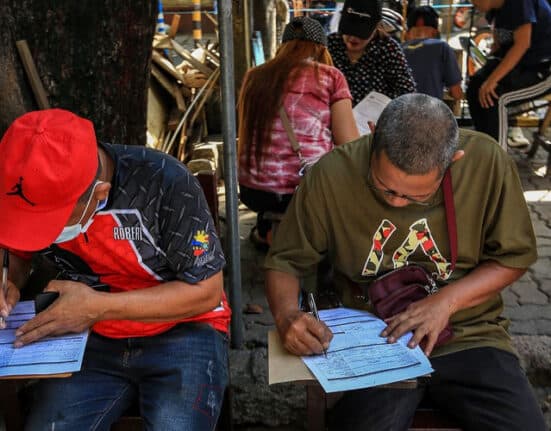AS election approaches, political candidates show up to showcase their promised projects to the community – convincing the society they are worthy of a position in the government.
Their strategies often include various tactics to reinforce name recall, from distributing pamphlets featuring their partylist, handing out envelopes stuffed with cash, to providing packs of goods to temporarily support families in exchange for votes.
This strategy often works with less educated voters, or those who lack family members to guide them in understanding their voting rights.
But those who are aware, tend to trigger heated conversations among peers, given that they have information to develop their opinions for, often meeting contrasting views.
This upcoming 2025 election, Millennials and Gen Z will constitute the 63% of the voting population in the Philippines, according to the GMA Integrated News Research.
This significant demographic shift means that the younger voters, particularly Gen Z, known to be politically aware and vocal, often find themselves in conflict with their peers or older generations over differing political stances.
Although some conversations start as healthy debate, they often end up into bashing each other’s political viewpoints or choices of candidates.
In extreme cases, these arguments lead some voters to stop interacting with their peers, and some even go so far as to cut off friendships.
The importance of a healthy debate
Leo, 21, shared her experience of encountering friends with differing political views. Initially, she felt disappointment but later recognized that people’s mindsets can change over time.
Leo believes that one factor is misinformation, especially among those surrounded by like-minded individuals. In turn, she believes in extending understanding and engaging in healthy conversations.
“May different levels of understanding tayo sa mga bagay-bagay kaya much better if aalamin ko muna ang side nila. But if they still side with the oppressors, I will definitely call them out,” she explained.
Similarly, Mei, 21, also prefers to listen first, and only expresses her political opinion if the other party is willing to engage.
“During times na nagka-clash talaga ‘yung opinyon namin, I still listen but at the same time, I don’t allow them to change my mind unless maglatag sila ng facts and evidences gano’n,” she shared.
Understanding the distinction between baseless opinions and factual arguments is crucial for meaning political discourse.
On the other hand, Ralph, 21, who aspires to be a lawyer, believes there is no need to be emotional during political conversations, saying, “I prefer diplomatic discussions over senseless quarrel. Though, I can’t control myself when someone is pushing their belief that is beyond reasonable against an objective view,” he explained.
No opinion is superior
However, having a fact-based opinion doesn’t automatically make one superior. It is important to recognize that everyone is entitled to their views.
Unless the intent is genuinely to persuade someone about a candidate’s excellent background, there is no reason to deem another person as inferior for holding a different opinion.
Leo experienced this first hand with her older cousin, who imposed her views on Leo and her younger relatives.
“‘Yung pinsan ko, mas matanda siya sa ‘kin so ‘yung age hierarchy and superiority complex niya is nangingibabaw sa pag-hear out sa mga political views naming mga mas bata sa kanya. Ignorant and gusto niya ‘yung mindset namin and views ay pareha sa kanya,” she shared.
This imposition not only disregards the rights of younger voters, but also an act of age discrimination. The tension often arises when older generations believe that younger individuals have yet to learn the lessons they claim to have mastered.
While encouraging healthy discussions is important, Leo draws the line at those who impose their views.
“Yes, worth it ang pag cut-off ko sa ate ko. Naging toxic na rin kasi ang pag-force niya sa ‘min to be on her side sa politics. By cutting off, naging mas mapayapa and easy sa ‘ming magpipinsan ‘yung pag-express ng mga opinions namin,” Leo admitted.
This has allowed her and her cousins to express their opinions freely.
Family over politics
Although Leo found a positive solution, Mei struggles with similar issues.
She admitted to cutting ties with acquaintances but finds it far more challenging to distance herself from close friends or family.
“I unfriended them not only because I was disappointed but because I can’t bear to witness their hypocrisy on my feed. I just can’t stand such people. Iba nga sa kanila, known as someone na nagpe-preach about God – nagshe-share ng bible verses daily, pero ‘yung politikong sinusuportahan hindi naman makatao,” Mei shared, emphasizing the irony of people whose political views seem to contradict their claimed moral values.
However, when it comes to Mei’s relatives, it was a different risk despite them having questionable political opinions.
“I can’t risk the years of friendship and bond we have over politics, similar in the case of my relatives. Siguro I would be mad and super disappointed, but I can’t imagine cutting ties with my family because of politics,” she concluded.
This shows that a family’s bond could be stronger than political disagreements.
Know when to step back
Ralph believes that cutting ties would contradict his principles.
“Seeing my friends and families who have an objectively wrong political view will always help me remind myself that I have no guilt when things go sideways. They have the right to practice their free will, but I don’t want it to affect my mental health, so I just ignore their ignorant mindset,” he stated.
“I think letting time do its job to make them realize eventually that they’re wrong and I’m right is more entertaining. Seeing them regret their decisions and waste their efforts for someone who is blatantly fooling people and committing crimes is what I live for,” Ralph added.
This perspective emphasizes that while being politically aware is important, knowing when to step back from overwhelming political conversations that might impact mental well-being, is also valid.
Political views still matter
It may not be commonly valid for everyone to cut ties over political viewpoints, it is not entirely wrong to do so either.
Although political opinions may not reflect a person’s entire moral judgment, they often reflect how individuals want the society to be.
Iza, 23, shared a different perspective: “We can be bestfriends naman and still have disagreements. But let’s say—hypothetical ‘to ah. You are friends with someone who was sexually abused and got pregnant because of it, pero hindi niya ma-abort kasi ‘yung political figure na nanalo, hindi pro-abortion. O kaya naman ‘yung bestfriend mo physically abused ng lawful husband niya, pero hindi siya makapagpa-divorce kasi ‘yung political figure na nanalo, na binoto mo, ay tinanggal ‘yung legislation na ‘yon for them, I think ibang usapan na ‘yon.”
Such scenarios highlight the potential consequences of political beliefs on real-life situations.
It indeed presents a dilemma, when, for example, you have a brother who uses an illegal substance, and you learned that your friend supports a political figure advocating punitive measures against drug users, while you believe that many of them simply need rehabilitation.
Similarly, it may feel disingenuous, or even harmful, if you belong to a marginalized community and are friends with someone who idolizes a politician indifferent to your struggles.
Worst, it may feel terrifying to a woman to maintain a relationship with a person who agrees with a proud misogynist political figure.
So, it is entirely valid to distance oneself from individuals whose views contribute to an environment that may be unsafe or unwelcoming for you, just as it is valid for them to maintain their political stance opposite to yours.
After all, everyone is entitled to their opinion.
Leo’s choice to separate from her cousin to protect her political stance, Mei’s decision to unfriend acquaintances whose viewpoints she can no longer tolerate, Ralph’s option to step back to protect his mental health, and Iza’s willingness to distance herself from those who reinforce harmful political views, are all ways to coexist with people holding diverse political opinions without necessarily causing harm.
With reports from Bea J. Larosa
How useful was this post?
Click on a star to rate it!
Average rating 5 / 5. Vote count: 6
No votes so far! Be the first to rate this post.
We are sorry that this post was not useful for you!
Let us improve this post!
Tell us how we can improve this post?









